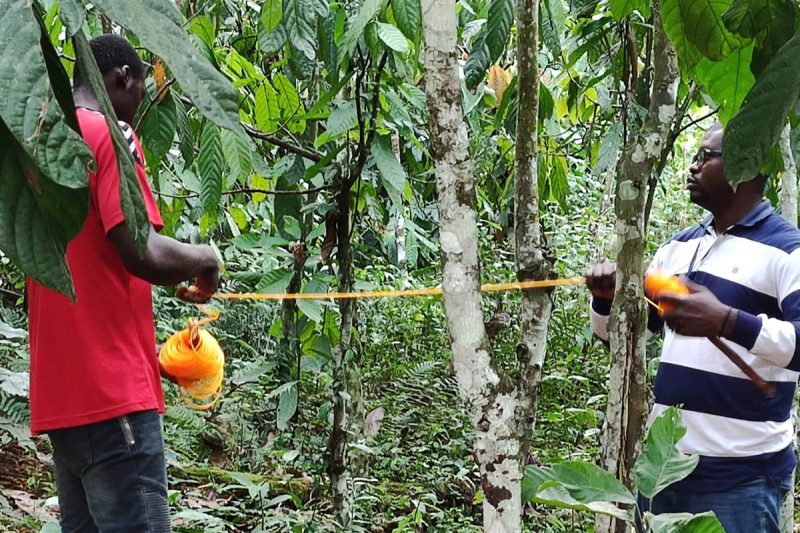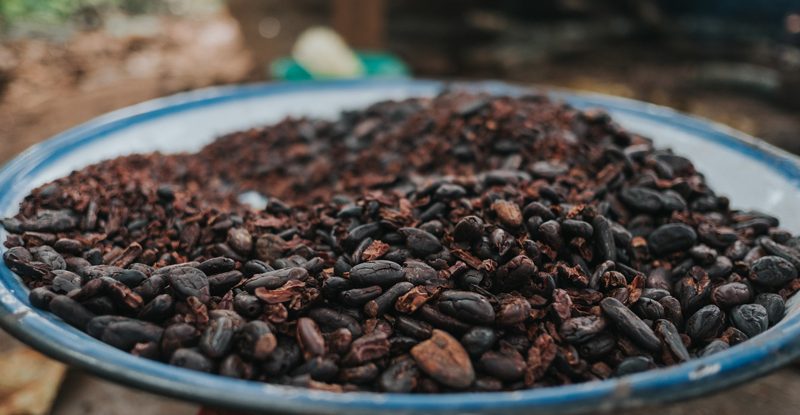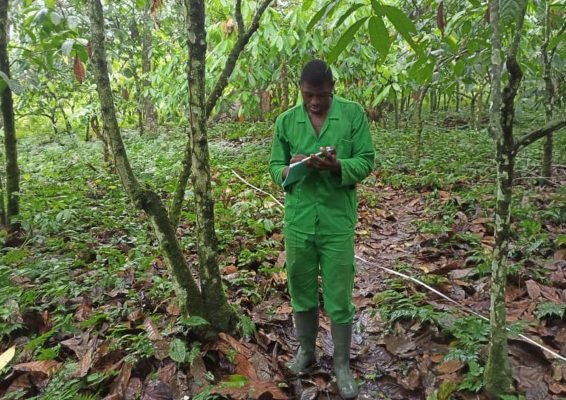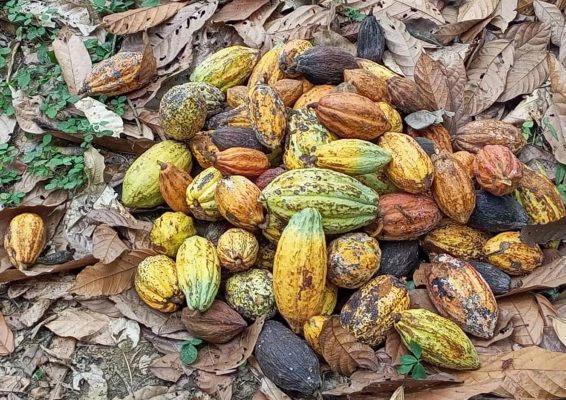Cocoa agroforestry that improves local livelihoods: sounds like a win-win for people and ecosystems, right? But a new study analyzing livelihood choices and deforestation impacts in the forest fringes of the Congo Basin shows that this may not necessarily be the case.
The international team of researchers surveyed 1035 households in the Cameroonian and Gabonese parts of the Tri-National Dja-Odzala-Minkébé transboundary conservation landscape (TRIDOM landscape) which forms a core part of the vast, biodiversity- and carbon-rich Congo Basin rainforest, which has been identified as a key resource to mitigate climate change.
They sought to understand local households’ livelihood strategies and the impact of those choices on land use and deforestation. Cocoa agroforestry, in which cocoa crops are grown under shade as part of a diverse, complex forest system, is a common livelihood strategy in the area – and a relatively lucrative one as the product can be traded internationally.
Local residents also practise various other livelihood activities, such as growing plantain, hunting wildlife and gathering non-timber forest products. Some specialize in one of these activities, and many carry out diversified strategies mixing cocoa, agriculture, and forest-based activities.
The researchers found that all kinds of agriculture can contribute to deforestation to some extent, but the impact from the marginally-higher income gained from cocoa production-based livelihood portfolios was particularly significant, being “associated with six to seven times higher deforestation compared to other livelihood strategies.”

Researchers measure cocoa trees in a Cameroon agroforestry system. Photo by Jonas Ngouhouo-Poufoun/University College of London
They also found that households tend to imitate the deforestation decisions of their neighbours. “In production countries, social interactions at the community level play a crucial role,” explained Jonas Ngouhouo-Poufoun, the study’s lead author and a senior research fellow in natural resource economics at the University College of London.
“The spatial spillover effect or indirect impact of cocoa production strategies resulting from social interactions on neighbouring deforestation is almost as significant as the direct impact on own deforestation,” he said.
A broader implication is that mimicry can lead to spatial diffusion of deforestation, creating a self-reinforcing cycle of deforestation in cocoa and cash crop production areas. “Understanding social interactions and neighbourhood effects is essential for a better understanding of deforestation in these countries and tailoring effective solutions at country levels,” said Ngouhouo-Poufoun.
The results suggest that if development leads to households switching their focus from small-scale agriculture to internationally-traded commodities such as cocoa, “this may result in a significant increase in deforestation,” said the authors. “Mimicry and resulting spatial spillover effects make cocoa an inherently high deforestation risk crop under weak land governance regimes.”
Conversely, households that consume a lot of what they produce are less likely to deforest the landscape than those that funnel their production towards markets. Yet, “when households have better access to markets, they tend to decrease their share of auto-consumption, which can also have a tendency to increase deforestation,” they wrote.
The study offers key insights for development projects and policies, with the co-authors calling for proper land use zoning coupled with incentives to mitigate deforestation – and the attendant climate-change impacts – from supposedly-sustainable agricultural practices like cocoa agroforestry.
“This study is important because when working on different land uses, the tendency is generally to focus on their direct effects on nature,” said Denis Jean Sonwa, a former senior scientist at the Center for International Forestry Research and World Agroforestry (CIFOR-ICRAF) who has recently moved to the World Resources Institute Africa as Director of RDI (Research Data and Impact), and is a co-author of the study. “However, the study highlights that cocoa is not just its farming component, but also includes all dynamics associated with its value chain consideration (including income and the way it can be managed).”
The co-authors concluded that, in the context of emerging international trade regulations on deforestation-free commodities, “the question of a development model which improves living standards and the resilience of households while preserving forests is an urgent matter. An approach to tackle the high risk of deforestation associated with cocoa could pass through farmers by promoting a complex cocoa agroforestry system coupled with better land covers/use planning and incentives enforcement for sustainable practices.”
Read the study here.
Acknowledgements
The fieldwork for this study was completed through the Center for International Forestry Research and World Agroforestry (CIFOR-ICRAF)’s Global Comparative Study on REDD+, with funding from the Norwegian Agency for International Development (NORAD). Funding for staff time was also received the UK Research and Innovation’s Global Challenges Research, Fund (UKRI GCRF) through the Trade, Development and the Environment Hub project.
We want you to share Forests News content, which is licensed under Creative Commons Attribution-NonCommercial-ShareAlike 4.0 International (CC BY-NC-SA 4.0). This means you are free to redistribute our material for non-commercial purposes. All we ask is that you give Forests News appropriate credit and link to the original Forests News content, indicate if changes were made, and distribute your contributions under the same Creative Commons license. You must notify Forests News if you repost, reprint or reuse our materials by contacting forestsnews@cifor-icraf.org.


